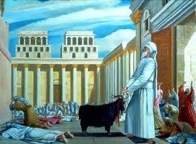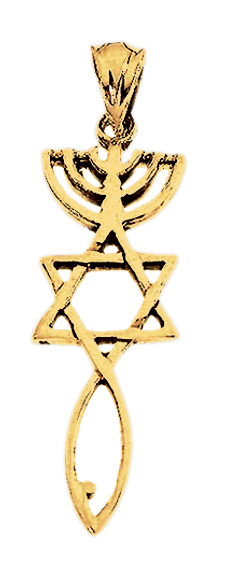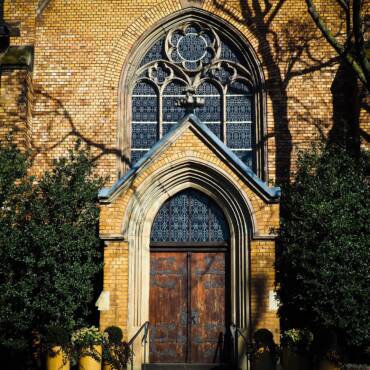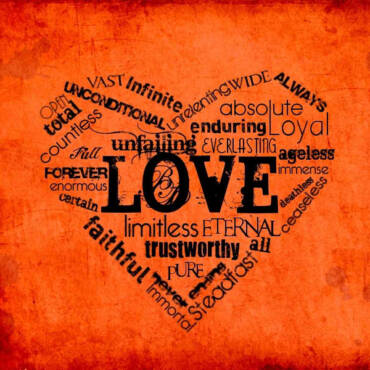Traditions of Uncertainty

By Sam Nadler
High Holy Days Customs & The Scriptures
As we prepare our hearts to pray for Jewish friends and neighbors during the High Holy Days, it may help us to understand how many Jewish people approach this season. At first glance it may seem this is a time of rejoicing. For those of us who have trusted in Messiah’s atonement, the Day of Atonement is certainly a reminder of complete forgiveness and new life in His perfect sacrifice for our sins. For most Jewish people, the High Holy Days of Rosh HaShanah and Yom Kippur are a time of uncertainty. Let’s examine some traditional views and rabbinal teaching from the Talmud to see why.
Customarily Rosh Hashana is “Judgement Day” when God evaluates who will be found worthy of life and who is not. Judgement based on deeds and only the thoroughly righteous are assured of life in the world to come. Those who are neither thoroughly righteous nor thoroughly wicked are the intermediate. They are given an opportunity to “prove themselves during the ‘ten days between New Year and the Day of Atonement” (Rosh HaShanah 18a). In the Talmud it is stated, “the entire sustenance of man [for the year] is fixed for him from New Year’s [festival] to the Day of Atonement…these days are known as ‘the ten days of Penitence.” (Beitzah 16a)
What happens during the ten ‘days of awe?’ The Talmud gives further insight.
“Three books are opened [in heaven] on New Year, one for the thoroughly wicked, one for the thoroughly righteous, and one for the intermediate. The thoroughly righteous are at once inscribed definitively in the book of life; the thoroughly wicked are at once inscribed in the book of death (iin the future world, i.e., of the soul). The doom of the intermediate is suspended from New Year until the Day of Atonement; if they deserved well they are inscribed in the Book of Life; if not, they are inscribed in the book of death.” (Rosh HaShanah 16b)
During these ‘ten days of awe,’ the religious Jew will attempt to do as many good deeds as possible to merit life for the next year and in the world to come. On Yom Kippur the Jewish community fills synagogues confessing sins and beating their chests hoping they have done enough to merit forgiveness and life. Does it help? Is one ever certain he has done enough? Is there truly forgiveness and restoration with God? Listen to these words of one of Judaism’s greatest rabbis:
“When Rabbi Yochanan ben Zakkai fell ill, his disciples went to visit him. When they saw them, he began to weep. His disciples said, ‘Mighty Hammer! Why do you weep? He replied, “If I were being taken today before a human king who is here today and tomorrow in the grave, whose anger if he is angry with me does not last forever; who if he imprisons me does not imprison me forever; and who if he puts me to death does not put me to everlasting death; who I can persuade with words, and bribe with money, even so I would weep. Now I am being taken before the supreme King of Kings, the Holy One, blessed be He, who lives and endures forever and ever, whose anger, if He is angry with me it is an everlasting anger; if He imprisons me, it is forever; if He puts me to death, puts me to death forever; and who I cannot persuade with words or bribe with money, nay more, when there are two ways before me, one leading to Paradise and the other to Gehinnom [Hell], and I do not know by which I shall be taken, shall I not weep?” (Berachoth 28b)
While traditions emphasize our works to attain forgiveness from God, the scriptures forbid us to work for or trust in our own works for forgiveness, particularly on the Day of Atonement: “you shall do no work on that same day, for it is the Day of Atonement; to make atonement for you before the LORD your God. For any person who is not afflicted in soul on that same day shall be cut off from his people. Any person who does any work on that same day, I will destroy from among his people.” (Leviticus 23:28-30)
Throughout the Bible, atonement and forgiveness is based on the principle of substitutionary sacrifice and faith rather than works. In agreement with Moses, Rabbi Shaul (Paul) wrote to the believers at Ephesus: [forgiveness] is the gift of God, not of works” (Ephesians 2:8-9; see also Genesis 15:6) Consider the contrast between trusting in man’s tradition and trusting in God’s word. We who have trusted Messiah can confidently say we are forgiven not because of our own deeds, but because of Messiah’s one great deed: full atonement.
Please pray for the Jewish people during the High Holy Days to hear the Good News of complete atonement and assurance in Messiah Yeshua. Shalom!



